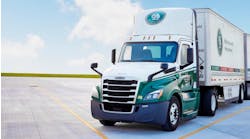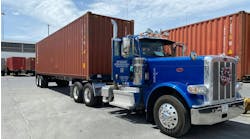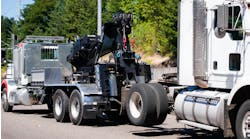Just 20 years ago, a typical Costco Wholesale store carried mostly boxed goods. Today, the same store stocks a variety of food products in varying quantities, everything from fresh produce, meat, seafood, and dairy to fresh baked goods.
For Costco's target market — large families and small- to medium-sized businesses — sales of product in large volumes and bulk packages are part of the strategy to help keep prices low. The company also limits available brands for sale within each product group.
In the U.S., 85% of food products are delivered to Costco warehouses from one of the company's 17 depots located strategically across North America. To further control costs, many food products are delivered on shipping pallets that are then used for display on the sales floor.
Sarah Mogk, Costco vice president of depot operations in Issaquah, WA, says over the years Costco has made significant investments in high-tech systems that can process, package, track and distribute thousands of grocery and non-grocery items efficiently between the depots and its 414 warehouse stores. “That efficiency,” she explains, “allows us to hold down costs so we can continue to provide members quality products at competitive prices.”
With 50-plus million members, Mogk says, “we look to maximize efficiency throughout the distribution chain. It only makes sense for our operation to have trucks with the latest in technology available. But our core competency is running a warehouse distribution system that provides just-in-time deliveries, not choosing trucks with the right specifications and then maintaining them.”
That's why Costco chooses to lease its vehicles. Since 2004, the company has been under full-service lease contracts with PacLease. The 295 Kenworth T800 and T660 model trucks are spec'd to provide the best fuel economy for the topography and climate where they run. Preventive maintenance, emergency roadside assistance, and fuel-tax reporting services are all included. According to Mogk, fuel economy for Costco's fleet did improve 2% overall, saving the company roughly $270,000 annually.
The Costco fleet also includes 1,500 leased 53-ft. trailers, 75% of which are Wabash dry vans and 25% are reefers made up of Wabash, Utility and Great Dane units. All reefers include Thermo King equipment.
Last year, with the company's truck leases coming up for renewal, Costco executives and drivers met again with PacLease reps, this time to refine specs.
As a result, Costco is switching its fleet over to the fuel-efficient 2011 Kenworth T660 equipped with 2010 Paccar MX 12.9L diesel engines (ranging from 380 to 475 hp.) and a Kenworth Extended Day Cab to provide drivers with more storage and arm room.
The T660s will also help Costco meet its environmental sustainability goal, reducing emissions of particulate matter by 1,102 metric tons and nitrogen oxide emissions by 8,598 metric tons over the course of the six-year lease.
As the largest member warehouse club in the U.S., keeping up with higher prices and more stringent regulations has not always been easy for Costco. But successful business strategies like choosing the right distribution truck are helping the company keep “cost” in its name but out of its products.


